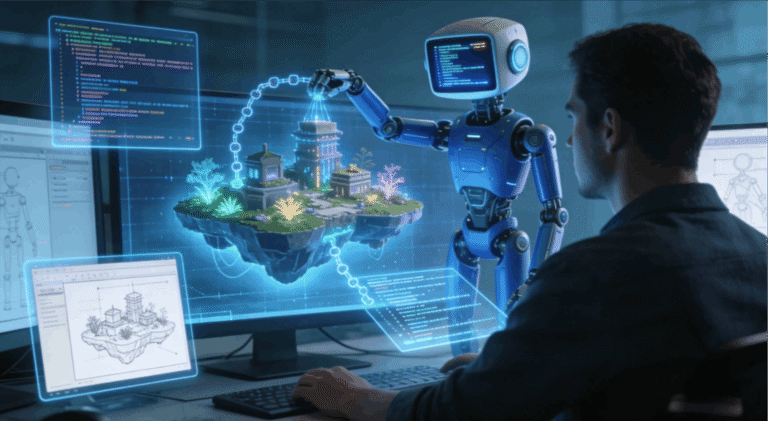
The education industry is stepping into the digital age, and AI, as the nucleus of the digital world, is the new driver for its revolution. With these diverse applications, AI chatbots in education have already been shown to be a valuable tool for increasing student engagement, extending accessibility to learning opportunities, and automating a range of administrative tasks. Backed by an AI chatbot development company, schools, colleges, and edtech platforms have started adopting chatbots to enable personalized, anytime accessible learning.
Whether it’s a virtual assistant providing information on a topic or an AI tutor solving the doubts of the students instantly, these smart bots are changing the way education is administered. As more and more institutions experiment with these technologies, the future of AI in education is looking bright, and it is contributed to in no small part by the innovative work and expertise of chatbot developers everywhere.
This post looks at the quickfire rise of AI chatbots in schools, and the benefits they hold for students and teachers, as well as the companies that are leading the way in developing smarter learning environments.
What Is an AI Chatbot for Education?
An educational chatbot is an AI-powered virtual assistant designed to help in the performance of the studying functions. These bots are capable of chatting with users through text/speech interface, responding to queries, reminding users to do something, explaining new concepts, and providing feedback.
Here are the examples of educational chatbots that include:
- A tutor assisting middle and high school students with their math problems
- A virtual teaching assistant responding to FAQ’s
- A school helpdesk chatbot to assist users with admissions or course information
- Mental health chatbots to support student well-being
By integrating AI tools for classroom as well as the self-paced learning ones are emerging as an integral part of today’s digital education.
How are Artificial Intelligence Chatbot Development Companies Contributing to This Change?
A great educational chatbot has a great group of developers, data scientists, and AI engineers backing it. If you really want to get the maximum bang for your buck, turn to an AI chatbot development company that knows how to create intelligent solutions for unique educational needs like K-12 education, higher ed, e-learning platforms, or corporate training programmers.
Here’s how these companies are influencing the industry:
Customized Learning Solutions
Developers can custom design chatbots in line with the curriculum and specialized for the needs of the learning groups. Whether it is storytelling on the fly for kids or a research assistant for PhD students, chatbots can be customized to serve contextually relevant content.
Integration with Learning Management System (LMS)
The majority of development teams also provide a simple and unproblematic connection of chatbots and common LMS like Moodle, Blackboard, or Canvas. That way students can communicate with the chatbot in their instructor’s digital learning environment.
Multilingual Capabilities
Multilingual chatbot service for global learners. The developers use natural language processing to develop chatbot, so it can understand and interact in all different languages which provides access and inclusion.
Continuous Improvement through AI
Machine learning is leveraged by AI chatbot development services to enhance chatbot experience. With the help of continuous improvement with AI, the bots can learn and gets smarter with the engagement. Thus, it offers better support and more engagement over time.
What are The Benefit of AI in Education?
AI-powered chatbots offer a wide array of benefits for students, teachers, and educational institutions. The benefits of AI in education include:
24/7 Availability
Students need help beyond the school day. And if students require help, a chatbot app can help them whenever they need.
Personalized Learning Paths
AI chatbots can process student data to recommend personalized learning resources and remediation content. This guarantees that learners receive support that matches their speed and comprehension.
Reduced Administrative Load
Transferring repetitive tasks to chatbots leaves teachers and administrators more time for tasks of strategic or added value.
Increased Interactivity
Chatbots can also be introduced to add interactivity in online learning with Conversational and gamified interaction. It’s more comfortable for students to talk with a bot than it is to raise their hand in class.
Special needs AI bots
There is scope for special needs AI bots to be able to serve students with disabilities, using voice-based interfaces, visual supports or simplified text so that we can make education more inclusive and equitable.
Successful Use Cases of AI Chatbots for Education
AI chatbots are already demonstrating their effectiveness in several learning and education scenarios. Here are some of the notable examples:
a. Georgia Tech’s Jill Watson
Constructed on the Watson development platform, this virtual teaching assistant responded to forum questions in an online AI course. Students didn’t even know Jill was a bot until the end of the semester.
b. Duolingo’s AI Bots
The language-learning app Duolingo has AI bots that conduct conversations as if it were the real world. This frees learners to practice without the fear of doing the wrong thing in public.
c. BYJU’S and Embibe
The top edtech companies in India have integrated AI-enabled assistants for providing adaptive learning, thereby getting the students to understand their weaknesses and improving the same.
These cases illustrate how a good AI chatbot for education can deliver cost-effective, high-quality, and scalable learner support for those of all ages and all locations.
Chatbot Download for Student Chatbots: What Features are Most Important?
When creating chatbot app for students, product companies focus on these features:
· Natural Language Understanding (NLU)
The chatbot needs to comprehend different student responses ranging from formal inquiries to informal language and even emojis.
· Knowledge Base Integration
The bot is expected to draw from textbooks, lecture, video content and FAQ responses to offer accurate responses.
· Performance Tracking
An intelligent chatbot follows student progress and provides efficient interventions or prompts to follow the right track.
· Privacy & Compliance
Responsible use of student data is a must. AI development firms need to be GDPR and FERPA compliant and also adhere to other data protection laws to stay afloat.
· Multi-Platform Access
You should be able to reach your bot via mobile app, a website, web chat in Teams, and embeddable chat.
The Future of AI in Education
There is potential in AI for education, with above the horizon developments set to reimagine classrooms across the world. Here are a few things to watch for:
AI-Powered Tutors for All Subjects
And they won’t just be Q&A bots, AI tutors will also be able to provide interactive lessons on topics as varied as science, coding, and even creative writing.
Emotion-Sensitive Learning Bots
And farther on, chatbots of the future could gauge through text sentiment or voice tone analysis if the student sounds excited or apprehensive, and they can respond with reassurance, greater difficulty or a flag to a teacher about a mental health alarm.
Data-Driven Curriculum Design
AI can also parse aggregate student interactions to see which teaching methods are most effective and help teachers fine-tune lesson plans.
Seamless Voice Integration
It won’t be long before we give students the chance to have near-human conversations with their education bots, as voice interfaces mature, and that’s when comfort levels and engagement will increase exponentially.
Virtual Classrooms with AI Moderators
AI bots could moderate online classes, take attendance and summaries of discussions and offer real-time polls or a quiz to test comprehension.
Challenges and Considerations
Despite all the potential, there are certainly challenges companies face for implementing AI technologies in education:
- Bias in AI Models: If not trained on diverse data sets, AI could perpetuate biases.
- Digital Divide: The students who don’t have the Internet and devices may get left behind.
- Reluctance: Teachers and schools can be slow to rely on technology for fundamentally important tasks.
- Privacy Issues: The data of the students is something that must be kept safe and never be misused.
An experienced AI Chatbot development company can help address these AI Chatbot implementation challenges by following an ethical development process and enforcing stringent data protection protocols.
A Final Word: A New Era of Learning
AI chatbots are not just a tech trend, they’re quickly becoming a necessity for enhancing education outcomes. From 24/7 homework help to smart classroom assistants, these bots provide help to teachers and students in new and exciting ways.
Together with them, the partnership of educators and AI chatbot development companies is important in designing systems, which are smart and also empathetic, inclusive and efficient as technology grows. The next era of education is not only digital, but also conversation-based, adaptive, and AI-led.
FAQs
Q1: What do you mean by an AI chatbot in education?
An AI chatbot for education is a virtual assistant powered by artificial intelligence that communicates with students or teachers by responding to questions, suggesting resources, or even completing some administrative tasks.
Q2: What are the advantages of AI chatbots for students?
Learners have access to information, personal learning support and immersive online learning 24/7. Chatbots also ease reluctance in the way of questioning, especially for timid or introverted learners.
Q3: Is it safe for students to use chatbot apps?
Yes, chatbot technology, when developed by trustworthy companies, respects data protection laws and integrates safety features such as moderated messages and limited access to personal data.
Q4: Will AI chatbots ever replace teachers?
No. Chatbots exist to help, not to replace, teachers. They automate tedious tasks and provide supplemental learning support so educators can concentrate on teaching critical thinking and mentorship.
Q5: What are some best practices for institutions to adopt AI chatbots?
However, schools can work with an AI chatbot development company to create personalized chatbots that are built to suit their subject matter, student requirements, and tech stack.
——————————————————————————————————————————-
Author Bio —
Name- Shahid Mansuri
Shahid Mansuri is the co-founder of Peerbits, a fast-growing global SaaS provider
that is now evolving into a scalable AI development company. With over a decade of experience
in building enterprise-grade digital products, Patel brings deep expertise in cloud architecture,
intelligent automation, and scalable platform engineering. He’s leading Peerbits’ AI expansion,
helping businesses bring value with custom AI and ML solutions.




